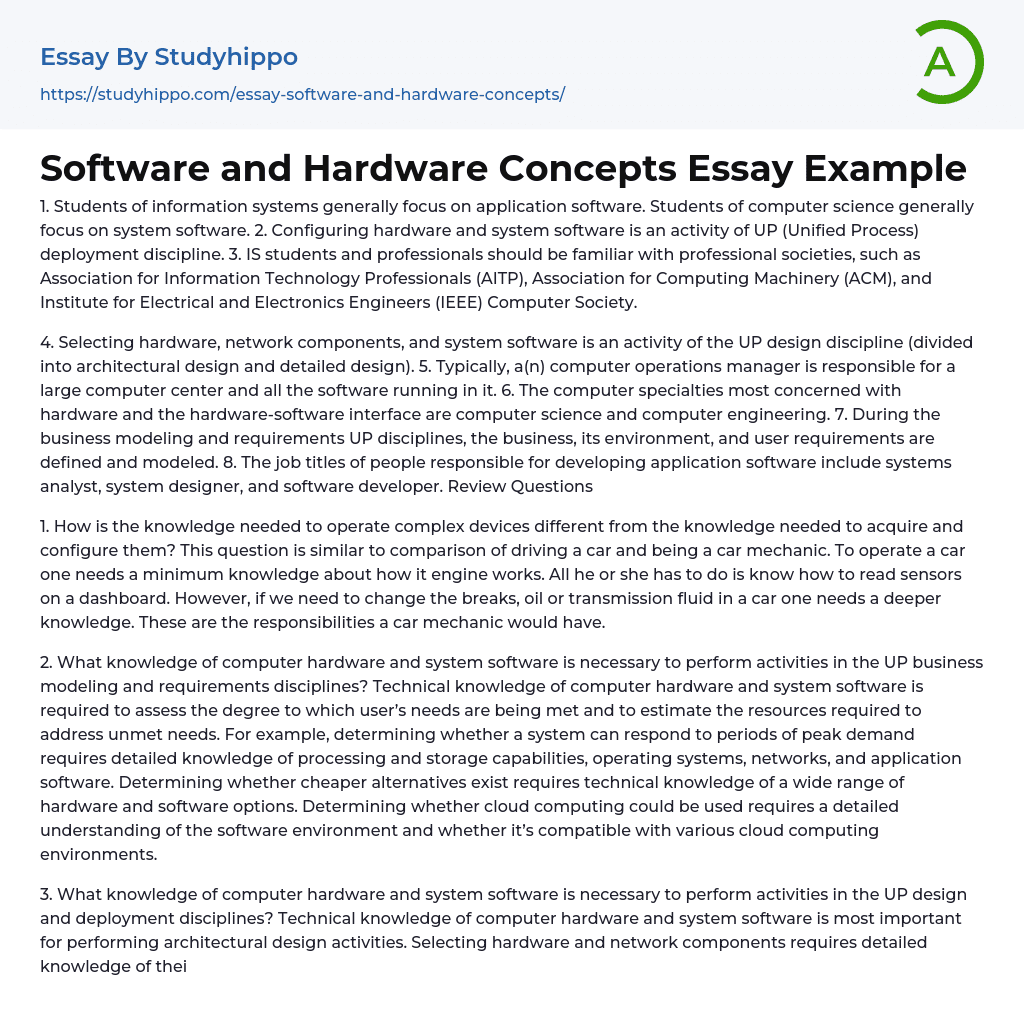1. Students of information systems generally focus on application software. Students of computer science generally focus on system software.
2. Configuring hardware and system software is an activity of UP (Unified Process) deployment discipline.
3. IS students and professionals should be familiar with professional societies, such as Association for Information Technology Professionals (AITP), Association for Computing Machinery (ACM), and Institute for Electrical and Electronics Engineers (IEEE) Computer Society.
4. Selecting hardware, network components, and system software is an activity of the UP design discipline (divided into architectural design and detailed design).
5. Typically, a(n) computer operations manager is responsible for a large computer center and all the software running in it.
6. The computer specialties most
...concerned with hardware and the hardware-software interface are computer science and computer engineering.
7. During the business modeling and requirements UP disciplines, the business, its environment, and user requirements are defined and modeled.
8. The job titles of people responsible for developing application software include systems analyst, system designer, and software developer. Review Questions
1. How is the knowledge needed to operate complex devices different from the knowledge needed to acquire and configure them? This question is similar to comparison of driving a car and being a car mechanic. To operate a car one needs a minimum knowledge about how it engine works. All he or she has to do is know how to read sensors on a dashboard. However, if we need to change the breaks, oil or transmission fluid in a car one needs a deeper knowledge. These are the responsibilities a car mechanic would have.
View entire sample
justify;">2. What knowledge of computer hardware and system software is necessary to perform activities in the UP business modeling and requirements disciplines? Technical knowledge of computer hardware and system software is required to assess the degree to which user’s needs are being met and to estimate the resources required to address unmet needs. For example, determining whether a system can respond to periods of peak demand requires detailed knowledge of processing and storage capabilities, operating systems, networks, and application software. Determining whether cheaper alternatives exist requires technical knowledge of a wide range of hardware and software options. Determining whether cloud computing could be used requires a detailed understanding of the software environment and whether it’s compatible with various cloud computing environments.
3. What knowledge of computer hardware and system software is necessary to perform activities in the UP design and deployment disciplines? Technical knowledge of computer hardware and system software is most important for performing architectural design activities. Selecting hardware and network components requires detailed knowledge of their capabilities and limitations. When multiple hardware and network components are integrated into a single system, the designer must evaluate their compatibility. Hardware, network, and overall performance requirements affect the choice of system software.
The designer must also consider the compatibility of new hardware, network components, and system software with existing information systems and computing infrastructure. Selecting appropriate development tools requires knowing the information system requirements and capabilities of the hardware, network, and operating system. Tool selection also affects future system development projects. Technical knowledge of computer hardware and system software is needed to perform many deployment tasks.
Installing and configuring hardware, networks, and system
software is a specialized task that requires a thorough understanding of the components being installed and the purposes for which they will be used. Tasks such as formatting storage devices, setting up system security, installing and configuring network services, and establishing accounting and auditing controls require considerable technical expertise.
4. What additional technical issues must be addressed when managing a computer center or campuswide network compared with developing a single information system? * Security; * Failover mode; * Maintenance staff training.
- Computer File essays
- Desktop Computer essays
- Servers essays
- Networking essays
- Telecommunication essays
- Network Topology essays
- Telecommunications essays
- Computer Components essays
- Personal Computer essays
- Computer Peripherals essays
- Flowchart essays
- Integrated Circuit essays
- Tracking system essays
- Hard Disk Drive essays
- Cloud Computing essays
- Computer Science essays
- Consumer Electronics essays
- Data Analysis essays
- Electronics essays
- engineering essays
- Enterprise Technology essays
- Hardware essays
- Impact of Technology essays
- Information Age essays
- Information Technology essays
- Modern Technology essays
- Operating Systems essays
- people search essays
- Robot essays
- Camera essays
- Cell Phones essays
- Computer essays
- Ipod essays
- Smartphone essays
- Android essays
- Application Software essays
- Benchmark essays
- Computer Network essays
- Computer Programming essays
- Computer Security essays
- Computer Software essays
- Cryptography essays
- Data collection essays
- Data Mining essays
- Graphic Design essays
- Information Systems essays
- Internet essays
- Network Security essays
- Website essays
- World Wide Web essays




